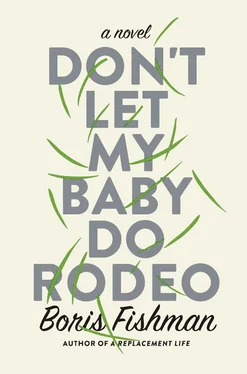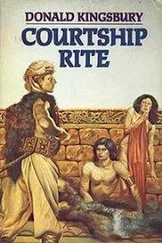“‘It is we who came to the Americans, not them to us,’ very carefully I was telling Sam,” Bender relayed. He expanded his vista: “Pioneers of new lands did not have culture shock, because first of all, they were not passive! They were realizing clearly that they were going to another world. And they were acting: either attacking or being attacked. They felt themselves the seekers, not the victims of new circumstances.” Bender relayed from his own history: “I remember how one of our first American friends liked to say: ‘I have only one life, but you, two.’ Both of them must be settled inside us, I told Sam, making us twice happier.”
Was the doctor proposing the opposite of what he had suggested by JFK Jr.’s experience? The young Kennedy had been ruined by assimilating too much the circumstances he was brought into; Sam, on the other hand, had to dive into them in order to save himself. (Dive he did, “very carefully taking the first steps in his new life,” according to Bender’s humble postscript.) Or was Maya, due to her inexperience, failing to understand that there was no contradiction at all?
Dejected, Maya looked at Alex again, but he was still trying to pretend he was not there, his eyes closed and his arms crossed at his chest. Bella, who turned to face Maya every several minutes to propose the taking of coffee (upturned pinky, inquiring expression), was blissfully fixed on her computer screen. Maya felt vastly alone. She had the impression that outside the drawn shades of Bender’s office existed a pure nothingness; she would open the front door of the converted ranch home and find beyond the aluminum-stamped steps a clean void. Inside, all resembled an ordinary doctor’s office on Skyline Extension; out there, the opalescent deep. Maya coughed out a noise of self-ridicule, drawing a solicitous stare and a pinky from Bella.
Maya’s stomach roiled. The void was also inside her. What a sentiment. Perhaps one did not even have to pay Bender; one could simply visit his reception room, whereupon the premises would confer a measure of enlightened unease. But then imagine what paying treatment might do, Maya thought, excitement returning to her; once again, she touched the hope that Max would emerge from Bender’s office cured rather than baffled. Maya sensed that she had been short on such hope, and this was the reason a quarry was going off inside her stomach. That, and the parade of insights, or at least possibilities, that was besieging her. She felt slightly high.
At the end of Bender’s opus, Maya found a third diagnosis of Max’s condition, though initially she disliked drawing lessons from the section on homosexuality. Citing the stories of homosexuals such as — here Bender committed a slight Freudian slip of his own—“the world-renounced dancer gay Nureyev,” Bender posited that rather than some kind of genetic destiny, homosexuality was either a rebellion against female liberation or a response to rejection. (Eleanor Roosevelt doted on her husband, but after he spurned her, what was she to do?) The next paragraph stopped Maya: “We must not forget that God created male Adam and female Eve. He did not create two gays or two lesbians. We are living in an open democratic society, not to tolerate any power over us. But we cannot say the same about power of the rules of Life!” In other words, genes are not a democracy. What had been written in JFK Jr.’s genes? In Sam’s? In Max’s? In her own? And was that what mattered, then, rather than resisting or welcoming circumstance? Maya wanted to ask Bender, though she felt the words would not form coherently if she spoke them out loud. She flipped to the end of the book. The back cover offered a glimpse of the author himself gazing solemnly into a mirror, the toll extracted by his emissions (their echo so disproportionate to their meager span of ninety-five pages) hooding his eyes — the greenhorn of the front cover transformed.
The door to Bender’s office opened, cracking the dusty silence of the reception room. Max blinked twice and stepped out. Bender watched diagnostically from the doorway. Then he tapped his watch and summoned the parents inside with an impatient twirl of one hand. Maya went toward Max but he climbed back in his seat and rested his forearms on the arms of the chair, like a satisfied customer. He seemed less nervous.
“The boy has dreamed about pike,” Bender announced to Maya and Alex when the door was closed behind them.
“He told you that?” Maya said resentfully.
Bender parted his hands wordlessly: a skilled professional gets the job done. “I made lemonade out of your ruse,” he said. “I said his mother had been having bad dreams lately, and so I was wondering if it was a family-wide problem. That was when he told me about the pike.”
“What about the pike?” Alex said.
“I’m afraid I must protect client confidentiality,” Bender declared.
“What is the point of all this then?” Alex said. Maya laid a palm on his wrist.
“To heal your son?” Bender said. “I have two observations to share with you. You can call one good news, one bad news. Which would you like first?”
Maya and Alex glanced at each other.
“The pike,” Bender went on without waiting, “is, essentially, the Russian national fish. It’s present here in America, but in nothing like the volume back home. Surely your father took you fishing for pike, Alex.”
“I was quite young when we left,” Alex said.
“There are entire communities in Siberia that would not survive without it. You can attribute a portion of Russia’s control of that vast region to the presence of pike. They have so much pike the dogs eat pike in Siberia.
“In any case, what I’m saying is that the boy is making good progress in the direction of his — his — his”—here, Bender’s smooth monologue stumbled and his brows rode together. Bender’s desire to obliterate his visitors with the power of his diagnosis had foundered on the uneasy etiquette of discussing adoption. No one among the Rubins’ acquaintances officially knew, though all understood. The psychologist took in a long breath and composed himself. “In the direction of his adopted culture,” he finished calmly.
Maya and Alex exchanged glances once more. They were prepared to celebrate, and they were prepared to despair, but they realized they didn’t understand which reaction Bender’s revelation was supposed to elicit.
“Which culture is the adopted culture?” Maya tried to clarify.
“That’s the good news,” Bender ignored her. “The bad news is that the pike is easily the most murderous freshwater fish in the world. They call pike ‘waterwolves,’ did you know that? Their teeth are like needles. When they come upon prey, they contract like a mamba and then lunge. I’m not talking about bluegills either. They will eat muskrats, duck, other fish their own size. They swim around with tails hanging out of their mouths — they can’t quite get down the victim. They build no nests and give no care to their young. Baby pike eat other baby pike to survive.”
“How do you know all this?” Alex said incredulously.
Bender flared his nose. He was caught between the desire to perpetuate his visitors’ impression of his work as a recondite craft and an equal compulsion to show them his research skills. The latter had the advantage of schooling his guests. He rose, plundered two shelves, and deposited two tomes on the edge of his desk: a book on the interpretation of dreams, and the Encyclopedia Britannica volume for Otter — Rethimnon.
“Elementary, my friends,” Bender folded his arms.
“But what does it all mean?” Maya inquired hesitantly.
“He is making the transition to his adopted culture,” Bender said, now getting out the sensitive words without difficulty. “Alas, it is not an untroubled transition.”
Читать дальше












